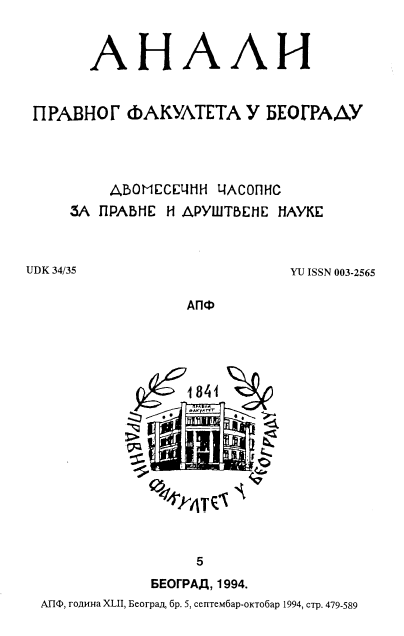МЕБУНАРОДНО КРИВИЧНО ПРАВО И ПОВЕЉА УН
INTERNATIONAL CRIMINAL LAW AND THE UN CHARTER
Author(s): Smilja AvramovSubject(s): Criminal Law, International Law
Published by: Правни факултет Универзитета у Београду
Keywords: International Law; War crimes; Ad hoc criminal court; Security Council; Nuremberg Court; Secession in Yugoslavia
Summary/Abstract: The history of the idea of punishing war criminals since the Versaille Peace Treaty to the London Treaty and establishing the Nuremberg Court is reviewed, folowed by an analysis of attempts to institute a permanent international criminal court. Favouring the instituting of such a court are the following arguments: a rather small number of war criminals brought to trial because of the Cold War; serious war crimes have been committed after the Second World War in local wars, which contributed to the increase ofattrocities, while remaining unpunished; almost without exception, contemporary wars are of a genocide character (a Gulf war, for instance). Ignoring the postulates of legal science and even elementary logic, the Security Council has established an ad hoc criminal court, while restricting it to the territory of Yugoslavia, which, in reference to total world criminality, is an exterme cynicism. The Resolution 827 is also criticized as it is a transgression of competences of that body. The Council may, as a political body, establish auxiliary bodies on the ground of article 29 of the UN Charter, but these bodies are not independent, since, in their nature their role is to advise. The Security Council, as a political and executivy body, has no legislative powers, which excludes its capacity to establish courts. As a consequence, another usurping of jurisdiction is the enactment of the Statute of the International Criminal Court. Another, serious violation of international law relates to the restriction of court’s jurisdiction. Restriction as to the lime of its activity runs counter the Convention on War Crimes as not being subject ot statute of limitations. The restriction regarding the subject matter also runs counter the Geneva 1949 Convention, as well as counter a series of other rules of international law. Procedural provisions of the Statute are also criticized. Further discussed are the differences between the Court established by the UN and the Nuremberg Court. These two institutions are entirely, and in details, disparate. The latter Court was established after the defeat of Axis Powers and represented a first step in restoring the legal order in the world, after many illegal acts committed by the Nazis, such as destroying States, establishing satellite States, waging aggressive wars, genocide against Serbs, Jews and Gypises, etc. The present-day Court, called "the New York Court" is but a component part of a deeply unlawful process, namely forcible secession, done by Croatia and Slovenia and the one inspired by the European Community - namely, that of Macedonia and Bosnia and Herzegovina, as well as the endeavour to make legal an illegal situation in that region of Europe. The Nuremberg Court has been established by a treaty, and under the corresponding legal procedure, while the New York one - contra legem, namely by a UN resolution. This has disturbed the institutional structure of decision-making and jeopardized the entire system of law. Establishing that Court is an entirely political matter and, viewed through legal optics, represents a farce.
Journal: Анали Правног факултета у Београду
- Issue Year: 42/1994
- Issue No: 5
- Page Range: 479-499
- Page Count: 21
- Language: Serbian

